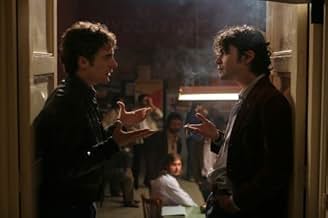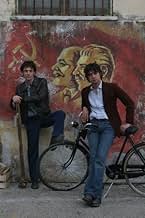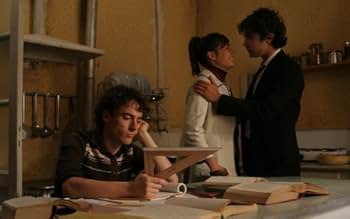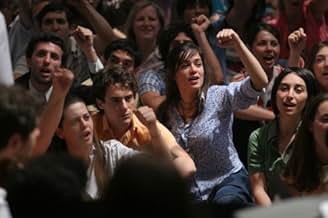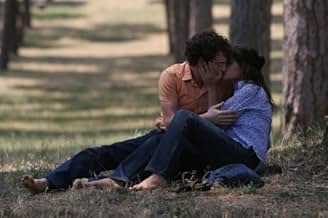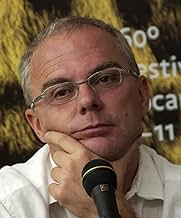VALUTAZIONE IMDb
7,0/10
6874
LA TUA VALUTAZIONE
Due fratelli diventano maggiorenni in una piccola città italiana degli anni '60 e '70.Due fratelli diventano maggiorenni in una piccola città italiana degli anni '60 e '70.Due fratelli diventano maggiorenni in una piccola città italiana degli anni '60 e '70.
- Regia
- Sceneggiatura
- Star
- Premi
- 19 vittorie e 29 candidature totali
Antonino Bruschetta
- Segretario Bombacci
- (as Ninni Bruschetta)
Recensioni in evidenza
Based on the novel by Antonio Pennacci, "My Brother is an Only Child" is a tale of two brothers growing up in Italy in the turbulent 1960s and '70s. Though remarkably alike in disposition and temperament, the two siblings, nevertheless, find themselves on opposite ends of the political spectrum. Manrico (Riccardo Scamarrio), the older of the two, is a committed Communist who rallies the workers in his town to stand up for their rights. Accio (Elio Germano), his younger brother and also the narrator of the story, is a hardcore Fascist who venerates Mussolini and participates in violent protests against the Marxists. A hothead and a bully by nature, Accio (the name actually means "bully" in Italian) finds a convenient outlet for his rage and violence in the thuggery and strong arm tactics he and his fellow fascists use against their adversaries. Manrico and Accio have obviously had a tumultuous love-hate relationship their entire lives, and things get even more complicated when Accio falls in love with Manrico's girlfriend, Francesca. But each man must ultimately decide where his true loyalty finally lies - with family or with the ideological cause that moves and empowers him. This becomes an even more complex question when one of the brothers becomes increasingly disillusioned with the goals and tactics used by his side, while the other grows increasingly radicalized in his commitment to his.
Director Daniele Luchetti brings renewed life to the coming-of-age genre with his intense concentration on the sociopolitical elements of the story. It gets so bad between the two warring factions that even a performance of Beethoven becomes a pretext for bloodshed and violence. And the constant tussling between the two brothers - who can't seem to see eye-to-eye on anything except the girl they love - becomes a microcosmic reflection of the larger world around them.
Uniformly superb performances and naturalistic direction make this a complex and ultimately very moving study of brotherhood, family, maturity and commitment.
Director Daniele Luchetti brings renewed life to the coming-of-age genre with his intense concentration on the sociopolitical elements of the story. It gets so bad between the two warring factions that even a performance of Beethoven becomes a pretext for bloodshed and violence. And the constant tussling between the two brothers - who can't seem to see eye-to-eye on anything except the girl they love - becomes a microcosmic reflection of the larger world around them.
Uniformly superb performances and naturalistic direction make this a complex and ultimately very moving study of brotherhood, family, maturity and commitment.
MY BROTHER IS AN ONLY CHILD ('Mio fratello è figlio unico') is a title that may confuse the casual movie viewer, but it is an apt summation of the rigorous story that this excellent Italian film by Danielle Luchetti (adapted from a novel by Antonio Pennacchi) represents - the coming of age of two brothers in the confusing and turbulent 1960's and 1970's in Italy. While the film deals with the myriad political factions that disrupted life especially among the students of that era, the main focus of the story is the indomitable brotherly love that bonds the two main characters.
Accio Benano (Vittorrio Emanuele Popizo) as a child is a mischief maker who has entered seminary to become a priest, but his innate search for truth and meaning soon finds him returning home to his little family in a Mussolini-fabricated town called Latina, a village built on promises of communal well-being (a housing project was built but the poor villagers are refused access to it), but languishes in the poverty of lost hopes and deflated spirits. Accio's father, mother, younger sister and older brother Manrico (Riccardo Scamarcio) are making ends meet, but are frustrated with the political oppression of the working class. Time passes and the older Accio (Elio Germano) comes under the influence of Mussolini's 'idealism' with the tutelage of his older friend Mario (Luca Zingaretti) and embraces Fascism while Manrico has aligned with the communists, and it is this dichotomy of belief that sets Accio apart from his brother as well as his family who are communist sympathizers. Accio's personality places him in harms way with the law, with women (he has longings for the women in both Mario's and Manrico's lives), and ultimately with turns of events that threaten to pit brother against brother. The resolution of these conflicts makes for a fascinating study of familial ties, brotherly love, and a keenly observed sociopolitical history of Italy that is as enlightening as it is entertaining.
While Germano and Scamarcio are the obvious stars of this well acted film, the supporting cast (including such fine actors as Angela Finocchiaro, Massimo Popolizio, Alba Rohrwacher, Anna Bonaiuto, and Diane Fleri) is uniformly strong. This epic film demands full attention to the script (Italian with English subtitles) to follow the various political differences, but the tenor of the film is one of the excitement and concomitant love of two brothers coming of age in the best Italian style! It is a joy to watch and a lesson in history about which we should all be aware. Grady Harp
Accio Benano (Vittorrio Emanuele Popizo) as a child is a mischief maker who has entered seminary to become a priest, but his innate search for truth and meaning soon finds him returning home to his little family in a Mussolini-fabricated town called Latina, a village built on promises of communal well-being (a housing project was built but the poor villagers are refused access to it), but languishes in the poverty of lost hopes and deflated spirits. Accio's father, mother, younger sister and older brother Manrico (Riccardo Scamarcio) are making ends meet, but are frustrated with the political oppression of the working class. Time passes and the older Accio (Elio Germano) comes under the influence of Mussolini's 'idealism' with the tutelage of his older friend Mario (Luca Zingaretti) and embraces Fascism while Manrico has aligned with the communists, and it is this dichotomy of belief that sets Accio apart from his brother as well as his family who are communist sympathizers. Accio's personality places him in harms way with the law, with women (he has longings for the women in both Mario's and Manrico's lives), and ultimately with turns of events that threaten to pit brother against brother. The resolution of these conflicts makes for a fascinating study of familial ties, brotherly love, and a keenly observed sociopolitical history of Italy that is as enlightening as it is entertaining.
While Germano and Scamarcio are the obvious stars of this well acted film, the supporting cast (including such fine actors as Angela Finocchiaro, Massimo Popolizio, Alba Rohrwacher, Anna Bonaiuto, and Diane Fleri) is uniformly strong. This epic film demands full attention to the script (Italian with English subtitles) to follow the various political differences, but the tenor of the film is one of the excitement and concomitant love of two brothers coming of age in the best Italian style! It is a joy to watch and a lesson in history about which we should all be aware. Grady Harp
'My Brother is an Only Child' tells the story of two red-blooded siblings as they take their first steps into political and sexual adulthood in the Italy of the 1960s. It's an intriguing premise, but for me, it didn't quite come together. Specifically, the fascism and communism that its protagonists pursue seem obviously unappealing: the film fails to convey how anyone could follow such causes except out of immaturity, though there are some funny moments (the new leftist lyrics to Beethoven's Ninth Symphony the most obvious of them). At the end of the film, a housing scandal is exposed, but the film doesn't really explain how the scam had worked: the story would make sense if the houses in question hadn't actually been built, but in fact they have been, and one senses that the writer has resolved a happy ending without worrying too much about the details. What's nice about this film is its portrait of a place and a time, and the very believable love-hate relationship between the brothers; but if you weren't there yourself, perhaps its inevitable that you find yourself looking in from the outside.
There's this much to be said for this movie from the ranks of Italy's new young directors and actors: The quality of the acting was at least one notch above the usual fare, which almost never transcends the clichéd facial expressions and intonations we expect to find in TV dramas and sit-coms. This new generation of actors and directors was raised on US television imports ("telefilms") and Latin-American soaps, and it definitely shows in the uninspired and uninspiring quality of their work. And one gets the impression that 90% of them come from Parioli, a very well-to-do neighborhood of Rome, that would be the rough equivalent of coming from Santa Monica, Lake Forest IL, or Westport Conn—all those perfectly groomed faces coming from families of the Italian haute bourgeoisie with unlimited funds to advance their children's "acting career." If it weren't for Elio Germano as Accio (as well as Luca Zingaretti as Accio's fascist mentor and Anna Bonaiuto as his wife), this movie would probably fall into the same category of banalized film-making with all the rest.
But Germano's performance is not enough to salvage a film that fails to rise above a rating of "mediocrity +". Certainly it was an interesting idea to situate the action in Latina, a city built from scratch by Mussolini's fascist regime after it had drained the surrounding swamp land (the "bonifica" that was one of Fascism's highly touted achievements). All of the city's architecture was inspired by fascist "monumental" design.
Regrettably, Luchetti has done little of interest to exploit this setting for his family drama other than to bring up the same old cliché of opposing extremisms (the thuggery of the neo-fascist right vs. the banditry and targeted terrorism of the extra-parliamentary left). And the drama of the conflict between these two extremisms is used altogether too much to drive the plot forward. Some Italian commentators disliked this film because it seemed to go over the same old ground in the same old way—when it was time, presumably, to move on to new subjects. But the problem was not that it rehashed Italian history—the problem was the "hash." Bellocchio, after all, did a wonderful job of re-interpreting to Italians the experience of the Red Brigades in his "Buongiorno,Notte".
But here the audience is simply given a choice between fascist hooliganism and a lunatic left, when actually the situation in Italy in the 60s and 70s was much more complicated and nuanced. Millions of Italians belonged to parties and movements that were seriously committed to a progressive transformation of Italy that did not involve knee-cappings and assassinations. And so Luchetti ends up confirming (perhaps despite himself) the American/Berlusconiano vision of the world: "Forget about ideology—it's all about individual freedom and authenticity in your personal relationships." And finally we can see the effects of Berlusconi's TV stations and their ilk also in the movie's script. After 20, I stopped counting how many times the characters said, "Ma Che Cazzo Dici?"("What the f#%k are you saying?"). It is a measure of the moronization of the Italian public under the sway of Berlusconi and Berlusconian media that the scriptwriters think that they can get a laugh out of an Italian audience with this phrase each and every time it is said—and sadly they're probably right.
But Germano's performance is not enough to salvage a film that fails to rise above a rating of "mediocrity +". Certainly it was an interesting idea to situate the action in Latina, a city built from scratch by Mussolini's fascist regime after it had drained the surrounding swamp land (the "bonifica" that was one of Fascism's highly touted achievements). All of the city's architecture was inspired by fascist "monumental" design.
Regrettably, Luchetti has done little of interest to exploit this setting for his family drama other than to bring up the same old cliché of opposing extremisms (the thuggery of the neo-fascist right vs. the banditry and targeted terrorism of the extra-parliamentary left). And the drama of the conflict between these two extremisms is used altogether too much to drive the plot forward. Some Italian commentators disliked this film because it seemed to go over the same old ground in the same old way—when it was time, presumably, to move on to new subjects. But the problem was not that it rehashed Italian history—the problem was the "hash." Bellocchio, after all, did a wonderful job of re-interpreting to Italians the experience of the Red Brigades in his "Buongiorno,Notte".
But here the audience is simply given a choice between fascist hooliganism and a lunatic left, when actually the situation in Italy in the 60s and 70s was much more complicated and nuanced. Millions of Italians belonged to parties and movements that were seriously committed to a progressive transformation of Italy that did not involve knee-cappings and assassinations. And so Luchetti ends up confirming (perhaps despite himself) the American/Berlusconiano vision of the world: "Forget about ideology—it's all about individual freedom and authenticity in your personal relationships." And finally we can see the effects of Berlusconi's TV stations and their ilk also in the movie's script. After 20, I stopped counting how many times the characters said, "Ma Che Cazzo Dici?"("What the f#%k are you saying?"). It is a measure of the moronization of the Italian public under the sway of Berlusconi and Berlusconian media that the scriptwriters think that they can get a laugh out of an Italian audience with this phrase each and every time it is said—and sadly they're probably right.
This film is a dilemma for me. The first half just bounced along. The music was perfect. The energy pulled me along with it, seeing what felt to me like real people's insight into the serious subject matter. Interesting subject matter, interesting characters with motivation, who I cared about. You do laugh at things, even when serious stuff is going on most of the time. I didn't think it could get any better.
And then in a blink of an eye (about an hour in, maybe), it all went to pieces. It dawdled slowly through clichés. I felt like I knew what was coming, and I didn't even care. It was implausible, and at times boring enough for me to lose concentration.
Part of the problem is that it is (as another reviewer noted) about 20 minutes too long. How come are there film directors - talented ones - who haven't yet noticed that 90 minutes is generally enough? 8/10 for the brilliant first half.
And then in a blink of an eye (about an hour in, maybe), it all went to pieces. It dawdled slowly through clichés. I felt like I knew what was coming, and I didn't even care. It was implausible, and at times boring enough for me to lose concentration.
Part of the problem is that it is (as another reviewer noted) about 20 minutes too long. How come are there film directors - talented ones - who haven't yet noticed that 90 minutes is generally enough? 8/10 for the brilliant first half.
Lo sapevi?
- QuizTaken from the novel "Il fasciocomunista", the title has been changed in "Mio fratello è figlio unico" as a tribute to the eponymous song by Rino Gaetano.
- Colonne sonoreSul mio carro (Chariot)
Performed by Sonia Cruceru
I più visti
Accedi per valutare e creare un elenco di titoli salvati per ottenere consigli personalizzati
- How long is My Brother Is an Only Child?Powered by Alexa
Dettagli
- Data di uscita
- Paesi di origine
- Siti ufficiali
- Lingua
- Celebre anche come
- My Brother Is an Only Child
- Luoghi delle riprese
- Aziende produttrici
- Vedi altri crediti dell’azienda su IMDbPro
Botteghino
- Budget
- 5.000.000 € (previsto)
- Lordo Stati Uniti e Canada
- 255.620 USD
- Fine settimana di apertura Stati Uniti e Canada
- 9357 USD
- 30 mar 2008
- Lordo in tutto il mondo
- 12.894.062 USD
- Tempo di esecuzione
- 1h 48min(108 min)
- Colore
- Mix di suoni
- Proporzioni
- 1.85 : 1
Contribuisci a questa pagina
Suggerisci una modifica o aggiungi i contenuti mancanti






